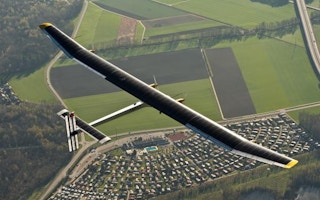The global transport sector was rocked by controversy in 2015 when German automaker Volkswagen admitted to cheating on its diesel emissions software.
However, the sector which is responsible for 23 per cent of global carbon emissions, also saw serious efforts from both government and businesses to push the fast growing sector towards a low-carbon future - from clean technologies in the electric car and the aviation industries to policy and financial commitments to mitigate emissions.
Here are the top 5 stories of the year:
1. Commitment to low-carbon transport
Transport researchers note that among the countries that submitted their Intended Nationally-Determined Contributions (INDCs) in November ahead of the Paris climate change talks, 71 per cent clearly identified the transport sector as a potential source of emissions reduction and 61 per cent of these countries had specific proposals to achieve this.
The Lima-Paris Action Agenda, a platform for government and non-government actors to cooperate on climate action, also saw 15 major initiatives for the transport sector including the aviation industry’s climate action plans, green roads, cycling, low-emissions taxis, and a commitment from 100 cities on sustainable urban mobility, among others.
Meanwhile, multilateral banks including African Development Bank, Asian Development Bank, CAF-Development Bank of Latin America, European Bank for Reconstruction and Development, European Investment Bank, Inter-American Development Bank, Islamic Development Bank, and the World Bank have committed to finance climate change mitigation particularly low-carbon transport solutions.These financial institutions also pledged to help countries that borrow from them build climate resilience into their transport policies .
2. VW’s diesel dupe
One of the biggest transport stories of the year is the shock discovery in September that German automaker Volkswagen intentionally fitted cheating devices into their diesel vehicles. Dubbed the “great diesel dupe”, the scandal was uncovered by the US Environmental Protection Agency, which found cheating devices in VW diesel cars. These devices detected when a car was undergoing an emission test, and changed the vehicle’s performance to excel at it.
But back on the road, the cars would turn off the controls, which meant the engines emitted nitrogen oxide pollutants - harmful to humans and the environment - up to 40 times above what is allowed in the United States.
Analysts say the fiasco could spur customers to buy ‘greener’ cars such as hybrid and electric cars instead of diesel vehicles. In India, for instance, diesel cars are increasingly losing favour, with the Supreme Court banning the registration of new diesel vehicles in New Delhi to reduce the high levels of air pollution in the capital.
Meanwhile, Toyota, the world’s biggest automaker, also announced in October it will stop selling gasoline-powered vehicles by 2050 and will instead make more hybrid and fuel cell cars.
3. Electric and driverless mobility
The electric car market has continued to grow over the last few years and in March, Germany’s Centre for Solar Energy and Hydrogen Research Baden-Württemburg released a report saying that the number of electric vehicles totalled 740,000 in 2014. Other reports in September showed that there are 1 million electric vehicles globally in 2015.
Other reports suggest that the market could be even bigger. Research firm Navigant estimated the “light duty EV market is expected to grow from 2.6 million vehicle sales in 2015 up to over 6 million in 2024”.The growth is driven by more investments in electric car production and technological advances in electric charging stations such as fast-charging and cloud computing-enabled chargers.
Reports showed that China was leading the global EV market in 2015.
US EV maker Tesla also made headlines this year, after its luxury sedan Model S P85D was named the best car ever by a top consumer review group in the US, setting new benchmarks for the automotive industry.
Meanwhile, several countries in Asia Pacific are seriously becoming test-beds for driverless cars, including Australia, China and Singapore.
4. Roads get friendlier
In Asia Pacific, transport-sharing initiatives such as Uber have been expanding and gaining support in cities like Melbourne and Manila, which have created new policies to accommodate the growing industry.
Car-free days are also increasingly being adopted in cities including Sydney, Seoul and New Delhi, with these cities reporting positive outcomes such as health benefits and a reduction in pollution levels.
Cycling as a mode of transport has also gained new supporters this year in cities including Beijing and Kuala Lumpur, which have made efforts to integrate cycling into the transport network and invested public funds to construct new cycling paths.
5. Flying on clean fuel
And in a flight that captured the world’s imagination, Swiss pilots Bertrand Piccard and Andre Borschberg embarked on a round-the-world flight in the Solar Impulse 2, a fully solar powered air plane to raise awareness on the importance of a transition to clean energy. The plane took off from Abu Dhabi in the United Arab Emirates, and has reached Hawaii so far.
Chinese airlines Hainan Airlines and Dragonair also launched their first biofuel-powered flights this year.
This story is part of our Year in Review 2015 series, which looks at the top stories that shaped the business and sustainability scene in each of our 11 categories.





















